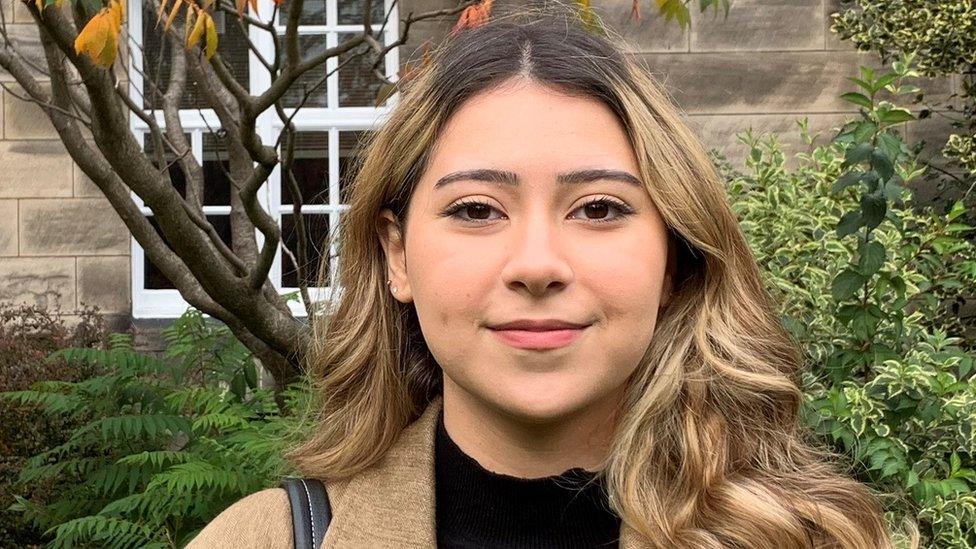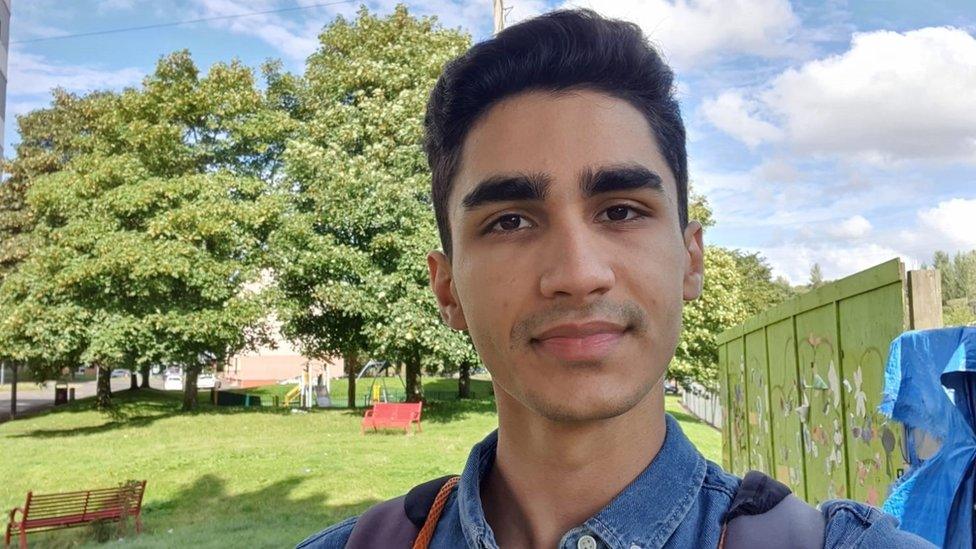Tuition fees residency rules breached human rights
- Published

Ola Jasim has lived in Scotland since she was 11 but was not eligible for free tuition fees
Scottish ministers are being forced to change the law on tuition fees for hundreds of students from migrant families after a landmark court case.
Lawyers successfully argued that Iraq-born Ola Jasim, who has lived in Scotland since she was 11, had her human rights breached.
She was told she could not access free tuition because she was two months short of the length of time required.
The Scottish government said it was committed to a fair funding system.
The Court of Session case was brought by 20-year-old Ola, who has been in Scotland for nine years.
Her whole secondary school education was at a school in Glasgow and she excelled in all her examinations.
But when she applied to study medicine two years ago she was told she could not access free tuition because she was 58 days short of the length of time she needed to have lived in the country.
The rules state that someone under 18 on the first day of their university course must be ordinarily resident in Scotland and have lived in the UK for seven years to qualify.
Anyone aged between 18 and 25 has to have lived in the UK for either half their life or 20 years.
Immigration is a matter reserved to Westminster but education is a Scottish government power.
The current regulations allow SAAS, the Scottish funding authority, no discretion in making decisions.
Ola took her case to the Court of Session which found the rules governing migrant student's access to tuition funding were unlawful in light of articles in the European Convention on Human Rights relating to discrimination and the right to education.
'Participated fully in Scottish society'
The decision is expected to affect hundreds of teenagers from migrant families who have been living in Scotland for years but perhaps not long enough to have met the threshold.
Scottish ministers must now introduce an interim scheme immediately with a public consultation and new legislation planned next year. It is not clear what the cut off would be to allow pupils to access the interim scheme but discretion will form part of decisions.
Ola is now in her third year studying medicine at Dundee University.
She said the university had been very supportive and allowed her extra time to pay her tuition fees.
Her mother worked as an engineer in Iraq but her qualifications are not recognised in Scotland so she is not working and her father is a scientist who is completing a Phd.
She said her parents were forced to borrow money from extended family to pay her fees and that for the past two years they had all had to give up all the small things which bring "joy in your life" including birthday cakes.
The court decision described the demand on her and her family to self-fund her as "intolerable".
It said she presently had limited leave to remain in the UK but intended to apply for indefinite leave to remain when she qualified.
The court said she had "participated fully in Scottish society".
'Life-changing decision'
Ola told the BBC the court's decision was "life-changing" for and her parents.
She explained: "For the past couple of years I have been their biggest financial burden and they have not only not had to look after themselves properly but my sisters as well because everything was going into me.
"It was a lot of guilt for me to deal with. My parents never complained about it but I could see the difference it made in their lives."
Ola said she called Scotland home so being told she could not access the same treatment as her school friends really upset her.
"It made me feel discriminated against even though this is what I call home," she said.
"You are really trapped. It was a lose-lose situation. Now I know the law is changing hopefully a lot of people's lives will be changed too because it is not just me who has been so badly treated.
"There are so many people out there who are in the same position."
The Scottish government has agreed to pay her fees for last year and she will now get her fees covered as she continues with her course.

Lawyer Andy Sirel said the decision would help many young people from migrant families
Lawyer Andy Sirel of Just Right Scotland took the case.
He said the decision would help many young people from migrant families who have been going to school in Scotland for years "to access college and university and fulfil their potential".
He told the BBC: "The Scottish government like to talk about how they are a pro-human rights government and are opposed to the UK government down south but with these rules they effectively copied and pasted the UK immigration rules on educational policy and have fallen in line with the home secretary.
"Now if you are going to talk the talk you need to walk the walk. On this situation we did not think the Scottish government had got it right. The court agreed and the Scottish government has been held to account."
The Scottish government said it is considering the outcome of the case and is committed to fair funding rules that help students succeed.
- Published25 August 2022
